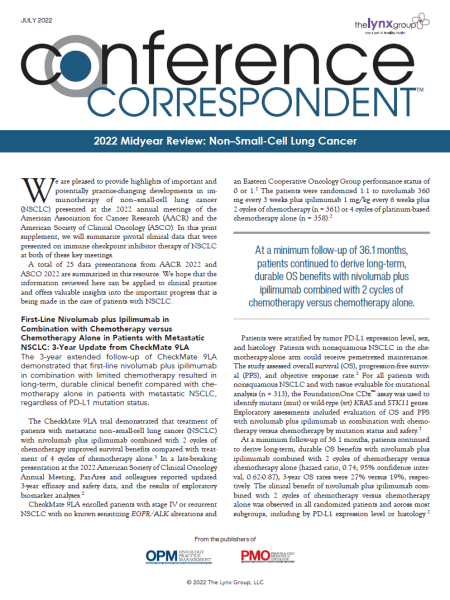Brigatinib (Alunbrig), a new-generation ALK inhibitor, significantly prolonged survival compared with standard of care with crizotinib (Xalkori) as first-line therapy in patients with advanced ALK-positive non–small-cell lung cancer (NSCLC). The median progression-free survival (PFS) was not reached in the brigatinib arm versus 9.8 months in the crizotinib arm. At 1 year, 67% of the patients who received brigatinib were still alive compared with 43% of patients who received crizotinib.
At the first interim analysis, the median follow-up was 11 months in the brigatinib arm and 9.3 months in the crizotinib arm. Disease progression or death occurred in 26% of those who received brigatinib versus 46% of patients who received crizotinib.
The median PFS was not reached with brigatinib versus 9.8 months with crizotinib, a 51% reduction in the risk for progression or death favoring the next-generation ALK inhibitor (P <.001).
These results of the phase 3 ALTA-1L clinical trial were presented at the 2018 International Association for the Study of Lung Cancer World Conference on Lung Cancer and were published simultaneously in the New England Journal of Medicine.1
“Brigatinib is a promising new treatment for inhibitor-naïve ALK-rearranged NSCLC. Brigatinib, a next-generation ALK/ROS1 inhibitor with broad clinical activity, is the only ALK inhibitor to demonstrate activity against multiple EGFR-mutant cell lines, and it has central nervous system [CNS] penetration,” said lead investigator D. Ross Camidge, MD, PhD, Joyce Zeff Chair in Lung Cancer Research, University of Colorado Cancer Center, Aurora. “In this first report of the ALTA-1L trial, brigatinib demonstrated the longest postcrizotinib progression-free survival of any ALK inhibitor in NSCLC.”
Fiona Blackhall, MBChB, PhD, Chair, Thoracic Oncology, University of Manchester, England, formal discussant of this trial, had a more cautious take on where brigatinib would fit in with currently approved ALK inhibitors.
“In the absence of randomized comparisons of next-generation ALK inhibitors, it will take some time to determine if there is indeed a best ALK inhibitor for our patients,” Dr Blackhall said.
The Phase 3 ALTA-1L Clinical Trial
This head-to-head, randomized ALTA-1L comparison of brigatinib versus crizotinib was conducted at 124 centers in 20 countries. The study enrolled 275 patients with advanced NSCLC with ALK mutation who had not received an ALK inhibitor. Patients with brain metastasis and up to 1 previous systemic therapy for metastatic disease were included in the study.
Patients were randomized in a 1:1 ratio to crizotinib versus brigatinib and stratified according to the presence of CNS disease and previous chemotherapy. Treatment was continued until disease progression or unacceptable toxicity. Overall, 35 patients crossed over from crizotinib to brigatinib after disease progression.
At baseline, the treatment arms were well-balanced for demographic and disease characteristics. Most patients (93%) had stage IV disease and 96% of them had adenocarcinoma; 29% of patients had asymptomatic brain metastases.
The objective response rate was 71% with brigatinib and 60% with crizotinib.
Intracranial Response
A subgroup analysis of PFS favored brigatinib over crizotinib.
“The effect size for progression-free survival was greater among those with baseline central nervous system disease, with an 80% improvement in intracranial progression-free survival for brigatinib compared with 28% improvement in those without baseline brain metastasis,” Dr Camidge said.
The estimated 1-year survival was similar with both agents—86% with crizotinib and 85% with brigatinib. Survival data are not yet mature, and longer follow-up is needed.
Among patients with measurable brain lesions, the rate of confirmed intracranial response was 78% with brigatinib and 29% with crizotinib (P = .0028). In patients with baseline brain metastases, the intracranial response rate was 67% versus 17%, respectively (P <.0001).
The median duration of confirmed response was not reached in the brigatinib arm versus 11.1 months in the crizotinib arm.
Treatment-emergent adverse events more common with brigatinib than with crizotinib included laboratory abnormalities, or “paper” toxicities, Dr Camidge said. Gastrointestinal effects, bradycardia, peripheral edema, and visual disturbances were more frequently seen with crizotinib than with brigatinib.
Grades 3 to 5 treatment-emergent adverse events were reported in 61% of the brigatinib arm and 55% of the crizotinib arm. Pneumonitis occurred in 4% and 2% of patients, respectively.
Reference
- Camidge DR, Kim HR, Ahn MJ, et al. Brigatinib versus crizotinib in ALK-positive non–small-cell lung cancer. N Engl J Med. 2018;379:2027-2039.

